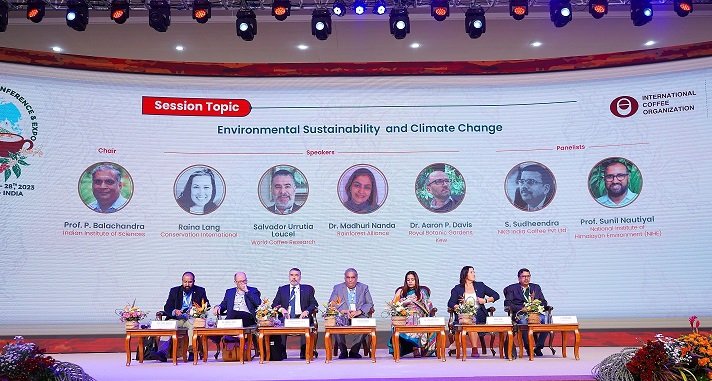Wednesday, 25 February 2026

Witnessing rapid changes in day-to-day environmental conditions, lead speakers, researchers and people from businesses of coffee industry stressed on the need to adapt ways and means for growing coffee with all effective and necessary initiatives needed to be taken for sustaining and further improving the future of coffee sector in the world.
Chairing the fourth session of plenary discussions at World Coffee Conference (WCC) on the third day at Bengaluru Palace in Bengaluru city on September 26, 2023, Prof. P. Balachandra, Chief Scientist Indian Institute of Sciences (India) moderated the deliberations from lead speakers United Kingdom, Brazil, USA, South Asia and Colombia, who gave insightful information on varied topics ranging from Climate change and its impact on Coffee value chain, breeding for climate change resilient varieties, use of alternative and innovative coffee species and on how startups with technology and digital innovative methods can be roped in to resolve the complex problems and challenges faced by the coffee sector.
Highlighting the issue of how the sudden climate and rising pest infestation has adversely impacted the coffee plantation, coffee cultivation and its production overall across the globe, Raina Lang, Senior Director, Sustainable Coffee Conservation International from United States of America stressed on the need for providing value for biodiversity. “Coffee is a very sensitive crop to climate change, in addition to this, it also vulnerable to more than 900 diseases causing pests and insects that can adversely impact on the overall production. Therefore, it is very important to give value to biodiversity as the entire life chain of organisms will work together in ecosystems, like an intricate web, to maintain balance and support life, and help improve our environment and overcome the challenges of climate change,” observed Raina Lang.
Another speaker from Latin American Salvador Urrutia Loucel, Director of Latin American World Coffee Research focused on breeding for climate resilient varieties of coffee species to not just overcome the challenges of climate change but at the same time improving the production of coffee in the world.
Dr Madhuri Nanda, Director of Rain Forest Alliance, South Asia stressed that impact of eco labelling is very much significant on sustainability of coffee farms. “As agrochemical management relative to biodiversity is vital, ecolabels can maximize consumer interest by enforcing and promoting agrochemical standards, i.e. production without pesticides, in addition to the characteristics of preserving biodiversity,” observed Dr Madhuri Nanda.
Expressing concern that the existing coffee species like Arabica, Robusta are becoming more and more vulnerable to climate change, growing pests infestations, Dr Aaron Davis of Kew Gardens from United Kingdom highlighted on the use of alternative coffee species in order to replace the existing species of coffee in the coming days. “Am afraid that if no corrective course is taken in advance to protect the coffee industry, the future for coffee sector will be very much challenging. As the existing species like Robusta and Arabica are facing the fury of climate change, diseases and pests, it is no surprise that these species will become extinct in the next 10 years’ period, similar to the species of Liberica which is hardly seen today,” observed Dr Davis, stressing on the need to develop and use of alternative coffee species to beat the climate change.
Giving further insights, Dr Davis said that there are more than 130 species of coffee existing globally, however only Arabica and Robusta are occupying 99.9 per cent, while the other varieties are not even occupying 0.1 per cent share globally. Keeping this view, he stressed on the need for promoting and improving more alternative varieties that suits the current environment and at the same time that helps in improving quantum of coffee production in the world.
S. Sudheendra, Managing Director of NKG India Coffee Pvt. Ltd, said that Indian coffee cultivation has been far ahead compared to the global coffee growers in doing research and bringing in more resilient varieties of coffee and sustainable initiatives since very long, however he expressed his desire to grow the domestic consumption and improve exports by enhancing production of coffee in a big way. “India’s coffee sector is just 1.6 per cent compared to other countries like Brazil and Colombia. There is a need for increasing production and enhancing exports,” observed Sudheendra.
Expressing his concern Professor Sunil Nautiyal, Director of GB Pant National Institute of Himalayan Environment, India, said that Indian Coffee plantations are becoming more and more prone to natural disasters and wild animal attacks causing heavy loss to the coffee growers. He urged the government to look into the issue and provide better incentives and support for such farmers who are impacted by the natural disasters. “In Pallipattu Taluk of Tamil Nadu alone has witnessed 1760 incidents of wild animal attacks on coffee plantations that caused severe damage. As coffee take a long duration and lot of investment damage by wild animals is a big dent on their prospects, which impacts on the overall production,” observed Professor Sunil Nautiyal.
Overall, the discussions of the lead speakers touched upon the varied points ranging from preserving biodiversity, breeding climate resilient varieties, alternative species of coffee and on issues how to cope with natural disaster and means and measures to support coffee farmers during the plenary session. All the speakers agreed on the point that it is high time to take initiatives to be future ready to not just overcoming climate change but also how to cope with natural disasters in the event of forest fires and wild animal attacks.